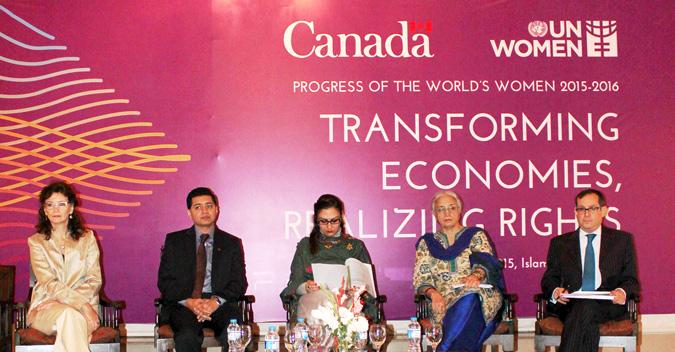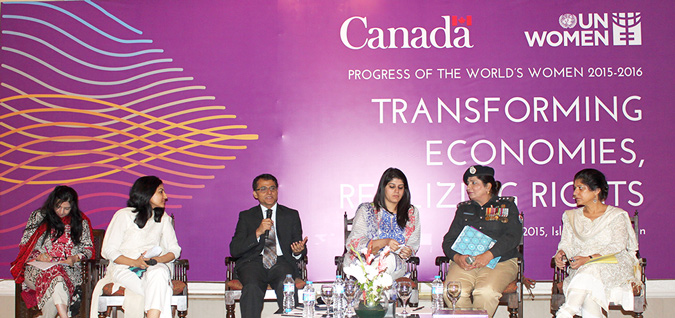New report from UN Women launches in Pakistan and unveils a far-reaching alternative policy agenda to transform economies and make gender equality a reality
Date:
PRESS RELEASE
“Progress of the World’s Women 2015-2016: Transforming Economies, Realizing Rights” is a flagship report of UN Women, the United Nations Entity for Gender Equality and the Empowerment of Women.

Just imagine, at the current pace of progress, a girl born today will be an 81 year old grandmother before she has the same chance as a man to be the CEO of a company. That is an excruciatingly long time to wait for equality and fair play.We have the largest cohort ever of educated women, including in Pakistan where there is plenty of evidence to suggest that girls are routinely outperforming boys in medicine, mathematics, and reading and graduating with top honors from schools and universities. Yet the irony is that globally, across the region and in Pakistan, women are struggling to find work.
Why aren’t the global and local economies fit for women?
Progress of the World’s Women documents the ways in which current economic and social policies are failing women in rich and poor countries alike, and asks what would the economy look like if it truly worked for women?
The report brings together human rights and economic policy making to call for far-reaching changes to the global policy agenda that will transform economies and make women’s rights, and equality, a reality.
Progress of the World’s Women investigates what this failure means- and proposes solutions. The report particularly looks at the ‘invisible’ economy of unpaid care and domestic work that anchors all economies and societies. The report also makes the case that the alternative economic agenda it outlines, would not only create fairer societies; it would also create new sectors of employment.
Mr. Jamshed Kazi, Country Representative, UN Women Pakistan, in his welcome address, shared: “If the economy really worked for women, (and for the benefit of all), women would have equal access to opportunities and resources – a good job with equal pay, or access to land – and social protection. Women’s life choices would be unconstrained by gender stereotypes, stigma and violence; the paid and unpaid work that they do would be respected and valued. Women would also have an equal say in economic decision-making: from having a voice in how time and money are spent in their households to the ways in which resources are raised and allocated in their national economies”. He added: “We know there are major gaps between this vision and the current reality. But this gap is not inevitable – we urgently need to build economies that work for both women and men”.
H.E. Ms. Heather Cruden, Canadian High Commissioner in her opening remarks said: “We need to challenge the status quo as it is critical to find solutions to understand and uphold women’s rights and gender equality, which will not only make economies work for women, it will benefit societies as a whole”. She also highlighted that today, for the first time we see the highest number of women Ambassadors in Pakistan, and are also role models for young girls.
Ms. Khawar Mumtaz, Chairperson, National Commission on the Status of Women speaking on women’s roles and economic development said: “Development and women’s rights are the side of the same coin. We need to work on legislations, policies, ‘growth’ programming and institutional strengthening at every stage and each level”.
The Chief Guest and Honorable Chairperson of the Benazir Income Support Programme, Ms. Marvi Memon, on behalf of the Government of Pakistan said: “We commit to support the findings of UN Women’s flagship report. We also offer our long-term commitment to the progress of the women of Pakistan”.
A holistic insight into this evidence-based report, with the Pakistan country context was presented by UN Women’s Regional Advisor on Women’s Economic Empowerment, Mr. Francisco Cos Montiel, and ten key recommendations for actions that governments and others can take in order to move towards an economy that works for women, and benefits all.
Eminent speakers during a policy discourse on women’s economic empowerment in Pakistan spoke on “Decent Work for Women” and “Gender Responsive Social Policies and Macroeconomic Policies. Speakers included: Mr. Hanif Channa (Planning and Development Department, Government of Gilgit-Baltistan), Dr. Saba Gul Khattak (World Bank), Ms. Zainab Saeed (Kashf Foundation), Ms. Shahzadi Gulfam (Pakistan’s First female International Peacekeeper in the UN), Ms. Shaza Fatima Khawaja (Member of National Assembly), Ms. Frida Khan (International Labour Organization) and Dr. Aliya Khan (Quaid-iAzam University).

For more information contact
Faria Salman (Ms.)
Strategic Management and Partnership Officer & Communications Focal Point
UN Women Pakistan
Email: faria.salman@unwomen.org